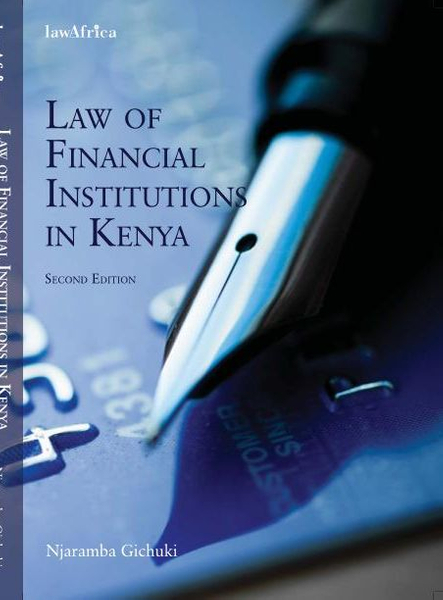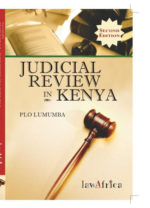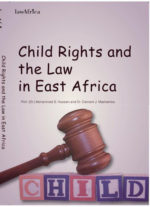The law of financial institutions in Kenya is contained in statutes as well as case law. The common law of England also plays an important role in the substantive law. Banking practice is elevated to the position of law (almost). The Central Bank of Kenya has powers to make guidelines and directives for the financial sector. When this is done, they operate within the confines of the law as the same are applied under the provisions of the Central Bank of Kenya Act, the Banking Act and the other relevant Acts.
Law of Financial Institutions in Kenya-Njaramba Gichuki
KSh 1,500.00
The law of financial institutions in Kenya is contained in statutes as well as case law. The common law of England also plays an important role in the substantive law. Banking practice is elevated to the position of law (almost). The Central Bank of Kenya has powers to make guidelines and directives for the financial sector. When this is done, they operate within the confines of the law as the same are applied under the provisions of the Central Bank of Kenya Act, the Banking Act and the other relevant Acts.
2 in stock
Related products
-
Litigation-The Art of Strategy and Practice
KSh 2,614.00Litigation – The Art of Strategy and Practice is a practical guide for lawyers and law students, offering insights on case strategy, courtroom skills, and effective advocacy.
The book is not meant to be the final solution to all practical legal problems but rather seeks to provide a quick reference to the common topical issues the litigator faces in court.
-
Judicial Review in Kenya-PLO LUMUMBA
KSh 1,700.00The importance of judicial review of administrative action to Kenya cannot be gainsaid. Kenya faces a burgeoning administrative structure in an environment in which “good governance” is yet to take root fully. Fashioned specifically to check excess of and lapses in, administrative action, judicial review is tailor-made for Kenyan circumstances, as they exist today.
-
LEGAL PRACTICE MANAGEMENT
KSh 3,500.00This book seeks to illuminate the expansive nature of legal practice in the society. It is also aimed at provoking further debate, research and publication. The author draws from her knowledge and experience as an Advocate, Accountant, Certified Secretary and Governance expert.
-
Principles of Constitutional Law -(Law africa)
KSh 2,700.00The main aim of this book is to provide the reader with knowledge and understanding of some of the key concepts, doctrines and principles which make up that corpus of law known as constitutional law. Another aim is to develop a sound academic basis for the study of subjects based on public law, such as political science and international relations.
-
Accounting for Lawyers
KSh 1,200.00This book recognizes the fear faced by many law students and to a great extent the practicing lawyer concerning accounting and seeks to provide a basic and simplifi ed understanding to accounting principles for those who have no previous accounting background while at the same time introducing some advanced topics for students with previous exposure and thus a deeper scope of accounting principles. The book also sought to incorporate key accounting principles and relevant changes and developments in the Kenyan industry. A comprehensive glossary of terms has been provided to assist learners in grasping key meanings and explanations
-
Principles of Constitutional Law
KSh 1,575.00The main aim of this book is to provide the reader with knowledge and understanding of some of the key concepts, doctrines and principles which make up that corpus of law known as constitutional law. Another aim is to develop a sound academic basis for the study of subjects based on public law, such as political science and international relations.
-
International Intellectual Property in an Integrated World Economy (Aspen Casebook)
KSh 60,000.00International Intellectual Property in an Integrated World Economy, Fourth Edition by Frederick M. Abbott, Thomas Cottier, and Francis Gurry, provides a comprehensive treatment of the international intellectual property system across the spectrum of intellectual property rights and interests. It introduces the institutional architecture at the multilateral, regional/plurilateral, bilateral and national levels. For each form of IP, it addresses the technical legal rules and illustrative jurisprudence, as well as economic and social welfare implications. Each of the authors has played a role in the development and implementation of the international rules, and they bring their experience to bear in introducing students to the field.
New to the Fourth Edition:
- The latest developments in bilateral and regional agreements regulating intellectual property, including NAFTA 2.0 (USMCA), CPTPP, and CETA
- Important new judicial decisions, including the U.S. Supreme Court decision adopting international exhaustion of patents and CJEU decisions addressing trademarks, geographical indications, and copyright
- Developments in IP and human rights; IP and competition law; and IP and health
- The WTO panel report in the Australia-Tobacco case
Professors and students will benefit from:
- An approach to the international IP system that situates the rules within the broader context of international law and the public policy objectives that governments, industry, and interest groups are seeking to achieve
- Case law from international dispute settlement bodies, as well as from national and regional courts
- Discussion of patent, trademark, geographical indication, copyright, design, trade secret, and data protection; as well as plant variety protection, protection of genetic resources and traditional knowledge, and the role of open source
- An explanation of the new European Union Unitary Patent system
- Exploration of the increasingly important role of emerging market IP systems
- Materials to help students understand the disputes between the United States and China involving IP, investment, and transfer of technology
- Inclusion of important jurisprudential developments
-
Child Rights and the Law in East Africa
KSh 2,200.00The book seeks to streamline the rights and protection of children in the three common law East African countries through law both now and in the future. The book also serves as a resource material in the area of child rights and the law, not only in East Africa, but also across Sub-Saharan Africa. It further seeks to stimulate debate on effective domestication and implementation of international child rights standards in East Africa.










Be the first to review “Law of Financial Institutions in Kenya-Njaramba Gichuki”